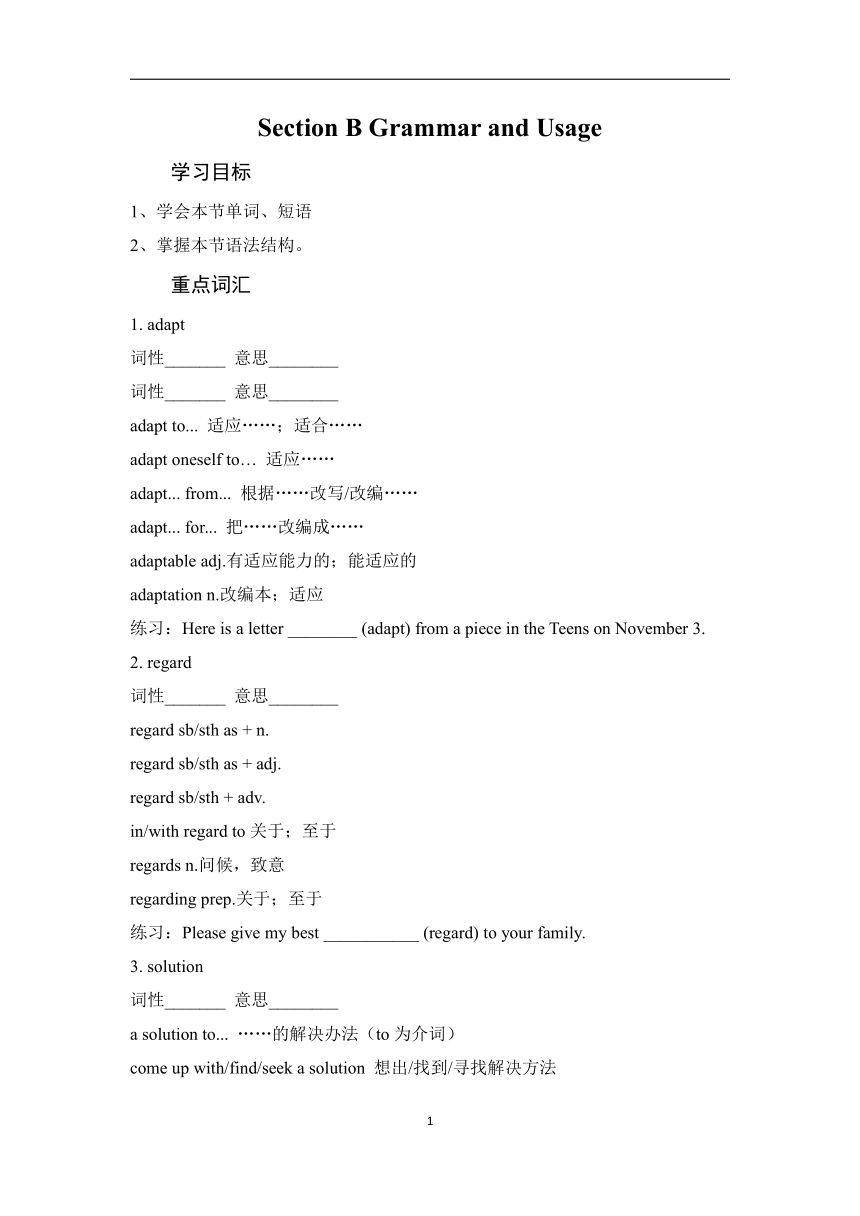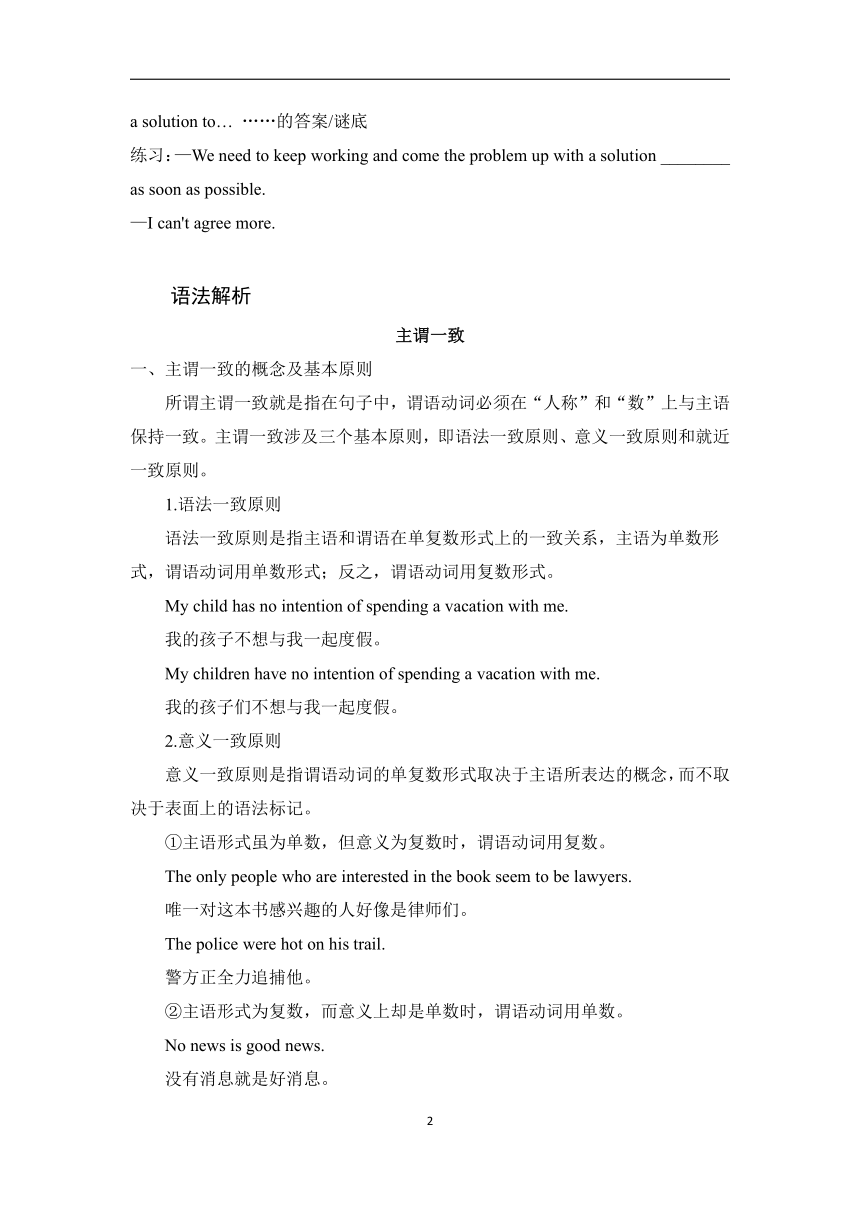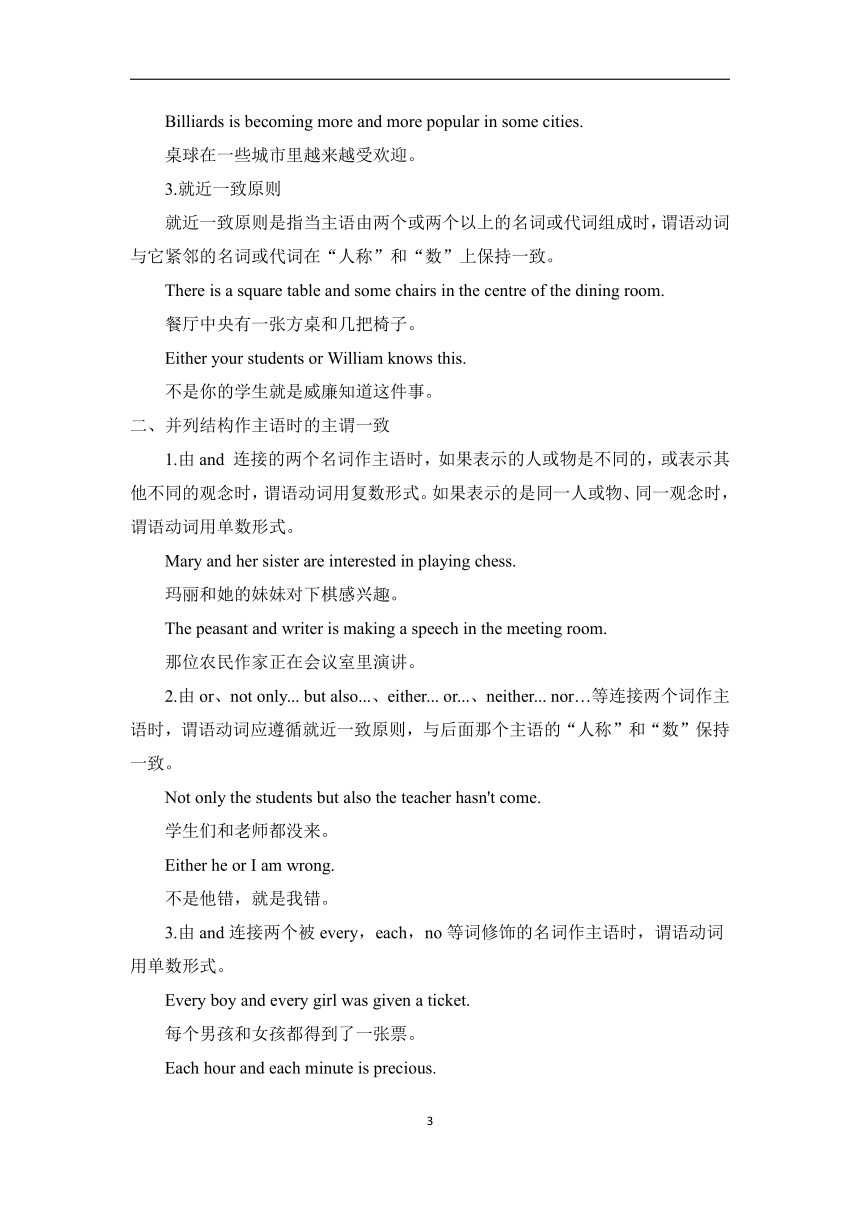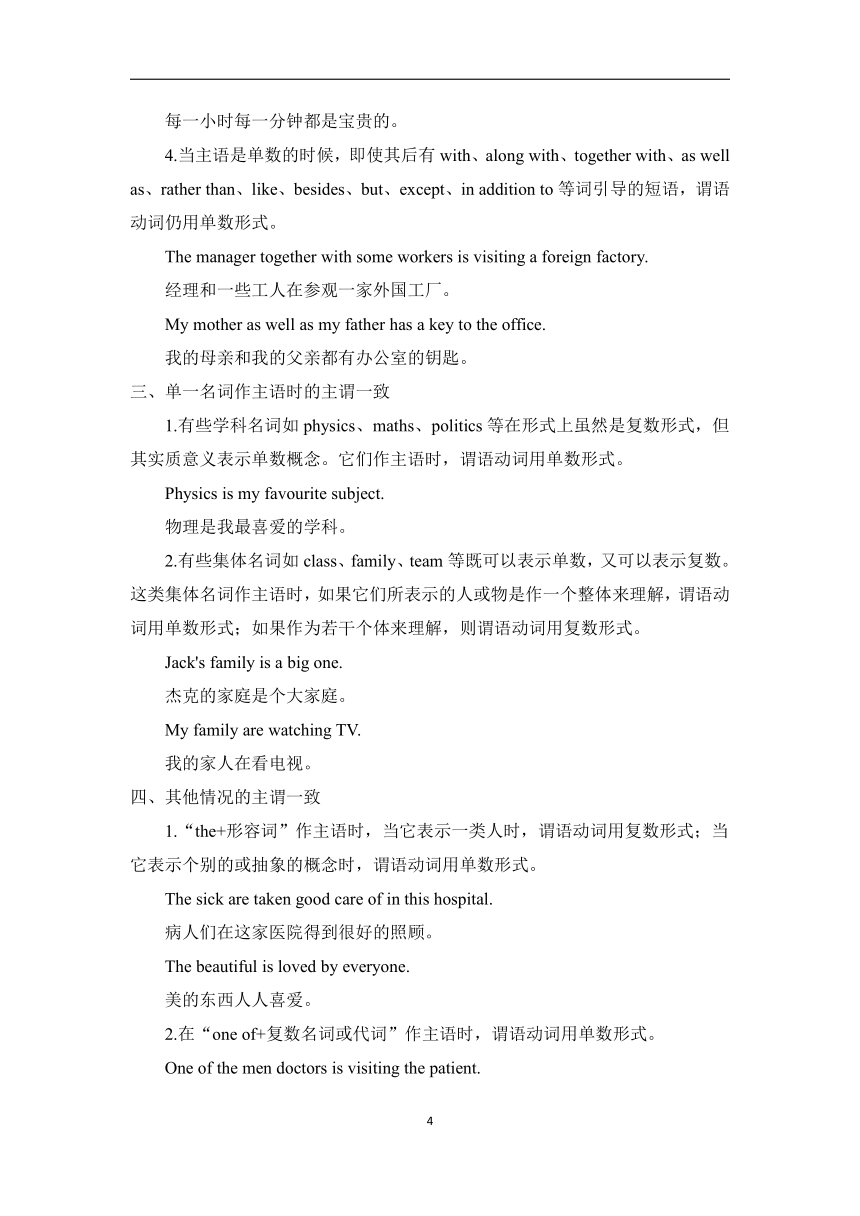牛津译林版(2019)必修第二册Unit 1 Lights,camera,action! Section B Grammar and Usage学案(有答案)
文档属性
| 名称 | 牛津译林版(2019)必修第二册Unit 1 Lights,camera,action! Section B Grammar and Usage学案(有答案) |  | |
| 格式 | doc | ||
| 文件大小 | 46.0KB | ||
| 资源类型 | 教案 | ||
| 版本资源 | 牛津译林版(2019) | ||
| 科目 | 英语 | ||
| 更新时间 | 2022-11-15 17:09:39 | ||
图片预览




文档简介
Section B Grammar and Usage
学习目标
1、学会本节单词、短语
2、掌握本节语法结构。
重点词汇
1. adapt
词性_______ 意思________
词性_______ 意思________
adapt to... 适应……;适合……
adapt oneself to… 适应……
adapt... from... 根据……改写/改编……
adapt... for... 把……改编成……
adaptable adj.有适应能力的;能适应的
adaptation n.改编本;适应
练习:Here is a letter ________ (adapt) from a piece in the Teens on November 3.
2. regard
词性_______ 意思________
regard sb/sth as + n.
regard sb/sth as + adj.
regard sb/sth + adv.
in/with regard to关于;至于
regards n.问候,致意
regarding prep.关于;至于
练习:Please give my best ___________ (regard) to your family.
3. solution
词性_______ 意思________
a solution to... ……的解决办法(to为介词)
come up with/find/seek a solution 想出/找到/寻找解决方法
a solution to… ……的答案/谜底
练习:—We need to keep working and come the problem up with a solution ________ as soon as possible.
—I can't agree more.
语法解析
主谓一致
一、主谓一致的概念及基本原则
所谓主谓一致就是指在句子中,谓语动词必须在“人称”和“数”上与主语保持一致。主谓一致涉及三个基本原则,即语法一致原则、意义一致原则和就近一致原则。
1.语法一致原则
语法一致原则是指主语和谓语在单复数形式上的一致关系,主语为单数形式,谓语动词用单数形式;反之,谓语动词用复数形式。
My child has no intention of spending a vacation with me.
我的孩子不想与我一起度假。
My children have no intention of spending a vacation with me.
我的孩子们不想与我一起度假。
2.意义一致原则
意义一致原则是指谓语动词的单复数形式取决于主语所表达的概念,而不取决于表面上的语法标记。
①主语形式虽为单数,但意义为复数时,谓语动词用复数。
The only people who are interested in the book seem to be lawyers.
唯一对这本书感兴趣的人好像是律师们。
The police were hot on his trail.
警方正全力追捕他。
②主语形式为复数,而意义上却是单数时,谓语动词用单数。
No news is good news.
没有消息就是好消息。
Billiards is becoming more and more popular in some cities.
桌球在一些城市里越来越受欢迎。
3.就近一致原则
就近一致原则是指当主语由两个或两个以上的名词或代词组成时,谓语动词与它紧邻的名词或代词在“人称”和“数”上保持一致。
There is a square table and some chairs in the centre of the dining room.
餐厅中央有一张方桌和几把椅子。
Either your students or William knows this.
不是你的学生就是威廉知道这件事。
二、并列结构作主语时的主谓一致
1.由and 连接的两个名词作主语时,如果表示的人或物是不同的,或表示其他不同的观念时,谓语动词用复数形式。如果表示的是同一人或物、同一观念时,谓语动词用单数形式。
Mary and her sister are interested in playing chess.
玛丽和她的妹妹对下棋感兴趣。
The peasant and writer is making a speech in the meeting room.
那位农民作家正在会议室里演讲。
2.由or、not only... but also...、either... or...、neither... nor…等连接两个词作主语时,谓语动词应遵循就近一致原则,与后面那个主语的“人称”和“数”保持一致。
Not only the students but also the teacher hasn't come.
学生们和老师都没来。
Either he or I am wrong.
不是他错,就是我错。
3.由and连接两个被every,each,no等词修饰的名词作主语时,谓语动词用单数形式。
Every boy and every girl was given a ticket.
每个男孩和女孩都得到了一张票。
Each hour and each minute is precious.
每一小时每一分钟都是宝贵的。
4.当主语是单数的时候,即使其后有with、along with、together with、as well as、rather than、like、besides、but、except、in addition to等词引导的短语,谓语动词仍用单数形式。
The manager together with some workers is visiting a foreign factory.
经理和一些工人在参观一家外国工厂。
My mother as well as my father has a key to the office.
我的母亲和我的父亲都有办公室的钥匙。
三、单一名词作主语时的主谓一致
1.有些学科名词如physics、maths、politics等在形式上虽然是复数形式,但其实质意义表示单数概念。它们作主语时,谓语动词用单数形式。
Physics is my favourite subject.
物理是我最喜爱的学科。
2.有些集体名词如class、family、team等既可以表示单数,又可以表示复数。这类集体名词作主语时,如果它们所表示的人或物是作一个整体来理解,谓语动词用单数形式;如果作为若干个体来理解,则谓语动词用复数形式。
Jack's family is a big one.
杰克的家庭是个大家庭。
My family are watching TV.
我的家人在看电视。
四、其他情况的主谓一致
1.“the+形容词”作主语时,当它表示一类人时,谓语动词用复数形式;当它表示个别的或抽象的概念时,谓语动词用单数形式。
The sick are taken good care of in this hospital.
病人们在这家医院得到很好的照顾。
The beautiful is loved by everyone.
美的东西人人喜爱。
2.在“one of+复数名词或代词”作主语时,谓语动词用单数形式。
One of the men doctors is visiting the patient.
其中一位男医生正在看望那个病人。
3.none of后接不可数名词时,谓语动词用单数形式;如果接复数名词,则谓语动词既可用单数,也可用复数。
None of the water from Lake Powell is used to irrigate the area.
鲍威尔湖的水没有被用来灌溉这一地区。
None of my friends have/has arrived yet.
我的朋友们都还没有到达。
4.number of前加a表示“许多的;大量的”,其后接复数名词时,谓语动词用复数形式;number of前加the表示“……的数量、数目”,其后接复数名词时,谓语动词用单数形式。
A number of scientists are invited to attend the conference.
许多科学家获邀参加这次会议。
The number of wild animals is becoming smaller and smaller now.
现在野生动物的数量正在变得越来越少。
5.“a lot of/lots of/plenty of/a large quantity of+名词”作主语时,谓语动词的数与名词的数一致,但“(large/huge) quantities/amounts of+名词”作主语时,谓语动词用复数形式。
A large quantity of people need our help.
许多人需要我们的帮助。
Quantities of clothes have been bought for the children.
已经为孩子们买了大量的衣服。
6.“many a/more than one+可数名词单数”作主语时,谓语动词用单数形式。“more than+数词+复数名词”作主语时,意为“……以上,谓语动词用复数形式”。
Many a boy is playing basketball on the playground.
许多男孩在操场上打篮球。
More than two children are naughty in my class.
在我班,不止两个孩子淘气。
7.主语为表示距离、时间、长度、价值、金额、重量等的复数名词时,谓语动词用单数形式。
Two miles is too far for the old man.
两英里对这位老人来说太远了。
Three years has passed.
三年过去了。
8.定语从句中谓语动词的“人称”和“数”由先行词决定;若先行词是“one of+复数名词”,用复数形式,若是“the only one of+复数名词”,用单数形式。
I, who am old, have never seen such a thing.
我虽年老了,却从未见过这样的事。
He is one of the students who come from England.
他是来自英国的学生之一。
He is the only one of the boys in our class who speaks English well.
他是我们班唯一英语说得好的男生。
9.动名词、不定式作主语时,谓语动词用单数形式,从句作主语时也用单数形式。
Learning English is not very difficult as long as you work hard.
只要你努力学习,学英语不是很难。
To do experiment is a good way to find out answers to questions.
做实验是找出问题答案的好办法。
10.如果主语由分数、百分数或all of、some of、most of等短语限定,谓语动词的单复数形式取决于名词的“数”。
Two thirds of the students are interested in movies.
三分之二的学生对电影感兴趣。
Most of the money has been collected.
已经筹集了大部分的钱。
11.如果主语由“a kind/a sort/a type/kinds/sorts/types of+名词”构成,谓语动词常与kind、sort或type保持“数”的一致。
This kind of flower is very beautiful.
这种花很漂亮。
These types of cars are sold to other countries.
这些种类的车被卖到了其他国家。
练习:
1. Of the nineteen recognized polar bear subpopulations, three are declining, six ___________ (be) stable, one is increasing, and nine lack enough data.
2. Amy, as well as her brothers, ___________ (give) a warm welcome when returning to the village last week.
3. The musician along with his band members _________ (give) ten performances in the last three months.
4. There _________ (be) a lot of rubbish on the floor so I asked Mary to sweep it up.
5. Three million tons of coal _________ (be) exploited every year in the city.
6. Stories of the Long March ________ (be) popular with the young people now.
7. Mathematics __________ (be) the language of science.
8. Both rice and wheat __________ (be) grown in our country.
9. __________ (have) either of your parents come to see you recently
10. What the children in the mountain village need __________ (be) good books.
答案
重点词汇
1. adapted 2. regards 3. to
语法解析
1. are 2. was given 3. has given 4. was 5. is 6.is 7. is 8. are 9. Has 10. are
2
学习目标
1、学会本节单词、短语
2、掌握本节语法结构。
重点词汇
1. adapt
词性_______ 意思________
词性_______ 意思________
adapt to... 适应……;适合……
adapt oneself to… 适应……
adapt... from... 根据……改写/改编……
adapt... for... 把……改编成……
adaptable adj.有适应能力的;能适应的
adaptation n.改编本;适应
练习:Here is a letter ________ (adapt) from a piece in the Teens on November 3.
2. regard
词性_______ 意思________
regard sb/sth as + n.
regard sb/sth as + adj.
regard sb/sth + adv.
in/with regard to关于;至于
regards n.问候,致意
regarding prep.关于;至于
练习:Please give my best ___________ (regard) to your family.
3. solution
词性_______ 意思________
a solution to... ……的解决办法(to为介词)
come up with/find/seek a solution 想出/找到/寻找解决方法
a solution to… ……的答案/谜底
练习:—We need to keep working and come the problem up with a solution ________ as soon as possible.
—I can't agree more.
语法解析
主谓一致
一、主谓一致的概念及基本原则
所谓主谓一致就是指在句子中,谓语动词必须在“人称”和“数”上与主语保持一致。主谓一致涉及三个基本原则,即语法一致原则、意义一致原则和就近一致原则。
1.语法一致原则
语法一致原则是指主语和谓语在单复数形式上的一致关系,主语为单数形式,谓语动词用单数形式;反之,谓语动词用复数形式。
My child has no intention of spending a vacation with me.
我的孩子不想与我一起度假。
My children have no intention of spending a vacation with me.
我的孩子们不想与我一起度假。
2.意义一致原则
意义一致原则是指谓语动词的单复数形式取决于主语所表达的概念,而不取决于表面上的语法标记。
①主语形式虽为单数,但意义为复数时,谓语动词用复数。
The only people who are interested in the book seem to be lawyers.
唯一对这本书感兴趣的人好像是律师们。
The police were hot on his trail.
警方正全力追捕他。
②主语形式为复数,而意义上却是单数时,谓语动词用单数。
No news is good news.
没有消息就是好消息。
Billiards is becoming more and more popular in some cities.
桌球在一些城市里越来越受欢迎。
3.就近一致原则
就近一致原则是指当主语由两个或两个以上的名词或代词组成时,谓语动词与它紧邻的名词或代词在“人称”和“数”上保持一致。
There is a square table and some chairs in the centre of the dining room.
餐厅中央有一张方桌和几把椅子。
Either your students or William knows this.
不是你的学生就是威廉知道这件事。
二、并列结构作主语时的主谓一致
1.由and 连接的两个名词作主语时,如果表示的人或物是不同的,或表示其他不同的观念时,谓语动词用复数形式。如果表示的是同一人或物、同一观念时,谓语动词用单数形式。
Mary and her sister are interested in playing chess.
玛丽和她的妹妹对下棋感兴趣。
The peasant and writer is making a speech in the meeting room.
那位农民作家正在会议室里演讲。
2.由or、not only... but also...、either... or...、neither... nor…等连接两个词作主语时,谓语动词应遵循就近一致原则,与后面那个主语的“人称”和“数”保持一致。
Not only the students but also the teacher hasn't come.
学生们和老师都没来。
Either he or I am wrong.
不是他错,就是我错。
3.由and连接两个被every,each,no等词修饰的名词作主语时,谓语动词用单数形式。
Every boy and every girl was given a ticket.
每个男孩和女孩都得到了一张票。
Each hour and each minute is precious.
每一小时每一分钟都是宝贵的。
4.当主语是单数的时候,即使其后有with、along with、together with、as well as、rather than、like、besides、but、except、in addition to等词引导的短语,谓语动词仍用单数形式。
The manager together with some workers is visiting a foreign factory.
经理和一些工人在参观一家外国工厂。
My mother as well as my father has a key to the office.
我的母亲和我的父亲都有办公室的钥匙。
三、单一名词作主语时的主谓一致
1.有些学科名词如physics、maths、politics等在形式上虽然是复数形式,但其实质意义表示单数概念。它们作主语时,谓语动词用单数形式。
Physics is my favourite subject.
物理是我最喜爱的学科。
2.有些集体名词如class、family、team等既可以表示单数,又可以表示复数。这类集体名词作主语时,如果它们所表示的人或物是作一个整体来理解,谓语动词用单数形式;如果作为若干个体来理解,则谓语动词用复数形式。
Jack's family is a big one.
杰克的家庭是个大家庭。
My family are watching TV.
我的家人在看电视。
四、其他情况的主谓一致
1.“the+形容词”作主语时,当它表示一类人时,谓语动词用复数形式;当它表示个别的或抽象的概念时,谓语动词用单数形式。
The sick are taken good care of in this hospital.
病人们在这家医院得到很好的照顾。
The beautiful is loved by everyone.
美的东西人人喜爱。
2.在“one of+复数名词或代词”作主语时,谓语动词用单数形式。
One of the men doctors is visiting the patient.
其中一位男医生正在看望那个病人。
3.none of后接不可数名词时,谓语动词用单数形式;如果接复数名词,则谓语动词既可用单数,也可用复数。
None of the water from Lake Powell is used to irrigate the area.
鲍威尔湖的水没有被用来灌溉这一地区。
None of my friends have/has arrived yet.
我的朋友们都还没有到达。
4.number of前加a表示“许多的;大量的”,其后接复数名词时,谓语动词用复数形式;number of前加the表示“……的数量、数目”,其后接复数名词时,谓语动词用单数形式。
A number of scientists are invited to attend the conference.
许多科学家获邀参加这次会议。
The number of wild animals is becoming smaller and smaller now.
现在野生动物的数量正在变得越来越少。
5.“a lot of/lots of/plenty of/a large quantity of+名词”作主语时,谓语动词的数与名词的数一致,但“(large/huge) quantities/amounts of+名词”作主语时,谓语动词用复数形式。
A large quantity of people need our help.
许多人需要我们的帮助。
Quantities of clothes have been bought for the children.
已经为孩子们买了大量的衣服。
6.“many a/more than one+可数名词单数”作主语时,谓语动词用单数形式。“more than+数词+复数名词”作主语时,意为“……以上,谓语动词用复数形式”。
Many a boy is playing basketball on the playground.
许多男孩在操场上打篮球。
More than two children are naughty in my class.
在我班,不止两个孩子淘气。
7.主语为表示距离、时间、长度、价值、金额、重量等的复数名词时,谓语动词用单数形式。
Two miles is too far for the old man.
两英里对这位老人来说太远了。
Three years has passed.
三年过去了。
8.定语从句中谓语动词的“人称”和“数”由先行词决定;若先行词是“one of+复数名词”,用复数形式,若是“the only one of+复数名词”,用单数形式。
I, who am old, have never seen such a thing.
我虽年老了,却从未见过这样的事。
He is one of the students who come from England.
他是来自英国的学生之一。
He is the only one of the boys in our class who speaks English well.
他是我们班唯一英语说得好的男生。
9.动名词、不定式作主语时,谓语动词用单数形式,从句作主语时也用单数形式。
Learning English is not very difficult as long as you work hard.
只要你努力学习,学英语不是很难。
To do experiment is a good way to find out answers to questions.
做实验是找出问题答案的好办法。
10.如果主语由分数、百分数或all of、some of、most of等短语限定,谓语动词的单复数形式取决于名词的“数”。
Two thirds of the students are interested in movies.
三分之二的学生对电影感兴趣。
Most of the money has been collected.
已经筹集了大部分的钱。
11.如果主语由“a kind/a sort/a type/kinds/sorts/types of+名词”构成,谓语动词常与kind、sort或type保持“数”的一致。
This kind of flower is very beautiful.
这种花很漂亮。
These types of cars are sold to other countries.
这些种类的车被卖到了其他国家。
练习:
1. Of the nineteen recognized polar bear subpopulations, three are declining, six ___________ (be) stable, one is increasing, and nine lack enough data.
2. Amy, as well as her brothers, ___________ (give) a warm welcome when returning to the village last week.
3. The musician along with his band members _________ (give) ten performances in the last three months.
4. There _________ (be) a lot of rubbish on the floor so I asked Mary to sweep it up.
5. Three million tons of coal _________ (be) exploited every year in the city.
6. Stories of the Long March ________ (be) popular with the young people now.
7. Mathematics __________ (be) the language of science.
8. Both rice and wheat __________ (be) grown in our country.
9. __________ (have) either of your parents come to see you recently
10. What the children in the mountain village need __________ (be) good books.
答案
重点词汇
1. adapted 2. regards 3. to
语法解析
1. are 2. was given 3. has given 4. was 5. is 6.is 7. is 8. are 9. Has 10. are
2
